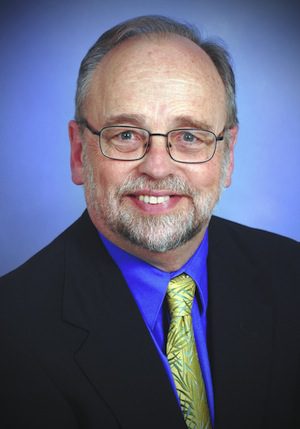West Honored for Scholarship, Service to Children’s Literature Field

Mark West is a self-effacing scholar who can deftly turn attention from himself to the students, faculty and staff in UNC Charlotte’s Department of English and to colleagues in the field of children’s literature.
Despite his reticence to stand in the spotlight, others are shining a beam on his decades of commitment to children’s literature. They have chosen West, chair of the English Department, to receive the 2016 Anne Devereaux Jordan Award.
Presented by the Children’s Literature Association, the award is a kind of lifetime achievement award, recognizing significant contributions in scholarship and service to the field of children’s literature over the course of the scholar’s career. West will receive the award at the association’s annual conference in June 2016.
The award’s recognition of the marriage of scholarship and of service – not just of one aspect of a scholar’s life – speaks to West.
“For somebody to give me an award that recognizes something that is so fundamental to who I am resonates with me in a deeper sort of way,” he says. “It’s something I care deeply about.”
West has taught children’s literature courses at UNC Charlotte every semester since he joined the faculty in 1984. He draws from his eclectic background, including his doctoral work in American Studies, and teaches his children’s literature classes from an interdisciplinary point of view.
“I’m bringing in the various things that I have studied over the years from different disciplines, whether it’s history, whether it’s psychology, whether it’s art, and I tie that into children’s literature,” he says. “I want students to understand the connection between the history of childhood and children’s literature. It’s attitudes that we have about childhood that in some way shape the way we write for children. If you think of children in a certain way, then you will write children’s books to reflect that belief system.”
UNC Charlotte is a powerhouse in children’s literature, with one of the strongest programs in the nation, he says. Scholars approach the field from three main areas of emphasis. Some consider it from the context of teaching reading and writing skills. The second group studies children’s literature within the context of library science.
Others – including West – think of children’s literature as literature.
“So it’s taught as literary works, in the same way that you would teach any other literary work,” he says. “It’s just that the difference between children’s literature and say, an American literature class, is the intended audience. The intended audience with children’s literature is children. You can have any kind of literature you can possibly imagine. It could be fantasy or realism; it could be from different time periods. As long as the intended audience is children, we would classify it as children’s literature.”
 West extends his love of literature to his research and his commitment to the community of scholars and the broader community. He has organized community literary events, taught classes and children’s summer camps and spoken at conferences and workshops. He has written and edited close to 15 books and mountains of academic papers, founded and edited academic journals and penned opinion pieces in mainstream media on contemporary social and literary topics, including censorship – a critical issue for West.
West extends his love of literature to his research and his commitment to the community of scholars and the broader community. He has organized community literary events, taught classes and children’s summer camps and spoken at conferences and workshops. He has written and edited close to 15 books and mountains of academic papers, founded and edited academic journals and penned opinion pieces in mainstream media on contemporary social and literary topics, including censorship – a critical issue for West.
“Children’s books are censored far more than any other type of writing,” he says. “This includes books that are being read by young people that aren’t initially thought of as children’s literature, but books that are being taught in schools. I worry a lot about censorship, so I have done many things over the span of my career to try to draw attention to this problem, and take a stance against censorship. I am trying to protect children’s rights to read, while increasing access to reading material, and protecting the authors’ rights to write about the topics they want to write about without interference from censors.”
West has given local talks on the subject and traveled to Singapore in March 2015 to speak on the issue of censorship of children’s literature there. In 1988, he wrote a book called Trust Your Children: Voices Against Censorship in Children’s Literature, in which he interviewed publishers, censored authors such as Judy Blume and Roald Dahl, and activists opposing censorship. He updated the volume in 1997, with interviews with Newbery award-winners Phyllis Reynolds Naylor and Katherine Paterson, among others.
“In the process of interviewing those authors, I learned a lot about their lives and what fuels their imagination, and then I was able to build that into my teaching,” West says.
In another example of his research impacting his teaching, he wrote an article about Dahl’s James and the Giant Peach, which Dahl read and liked. The two began a correspondence, which led to West writing a book about Dahl and teaching a class each semester about a Dahl book.
“My research with Roald Dahl is directly implemented in my class,” he says. “I talk about the day I spent with Roald Dahl and what I learned from him through the process of interviewing him over the course of a day.”
West brings his deep insights about children’s literature to bear as book review editor since 2000 for Children’s Literature Association’s peer-reviewed academic journal, Quarterly. He has also served as association president and chaired two of the association’s annual conferences when they were held in Charlotte. He also is one of fewer than a half-dozen scholars invited to represent the United States in China at a prestigious international symposium on children’s literature in June 2016.
West’s commitment to the broader community extends to organizing literary events, including the popular Seuss-a-thons hosted by the English Department and Park Road Books each year. He has taken the lead in organizing a Center City Literary Festival and has collaborated on other community literary festivals, including this November’s EpicFest, sponsored by the Charlotte Mecklenburg Library Foundation.
Last year, West helped launch RISE: A Children’s Literacy Journal, which he edits. The journal is aimed at teachers, librarians and parents concerned about children’s reading. Issues have covered everything from the role of literary fiction in the new Common Core standards to the enduring appeal of fairy tales.
“It fills an important gap in the field,” West says. “We educate by teaching our classes but we educate in other ways too. We share our insights with a broader audience…with people in our community. Our community engagement is sharing our expertise with a larger audience.”
For West, receiving this national award offers important recognition for the entire English Department, especially his children’s literature colleagues.
“When people believe in you and support what you’re doing, it’s easier to excel, because you have a foundation on which to build,” he says. “I readily acknowledge that I’m standing on other people’s shoulders, that I’m getting support from lots of people, and that I would not have been as successful in this field without that support.”
Words: Tyler Harris | Images: Lynn Roberson and Wade Bruton (headshot)